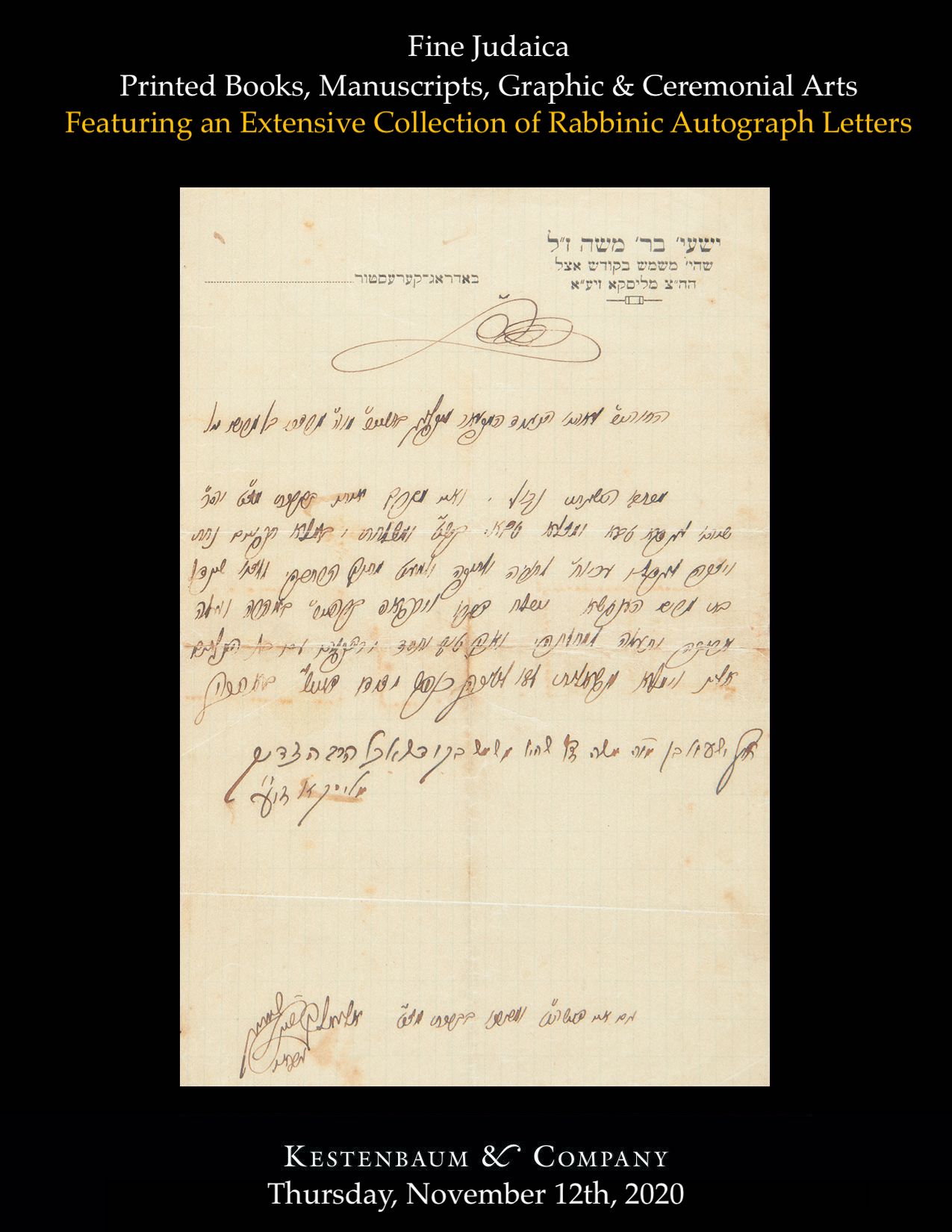Cyrus Comstock and John Tucker. Three important <<Letters>> concerning <<Ulysses S. Grant’s infamous Order No. 11>> expelling the Jews from the Department of Tennessee.

Auction 91 |
Thursday, November 12th,
2020 at 1:00pm
Fine Judaica: Printed Books, Manuscripts, Graphic & Ceremonial Arts Featuring an Extensive Collection of Rabbinic Autograph Letters.
Lot 129
(AMERICAN-JUDAICA)
Cyrus Comstock and John Tucker. Three important <<Letters>> concerning <<Ulysses S. Grant’s infamous Order No. 11>> expelling the Jews from the Department of Tennessee.
Washington: June 5, 1863; April 30, 1866; and May 13 1866
Est: $5,000 - $7,000
PRICE REALIZED $9,000
Fed up with traders known as “army followers” passing back and forth between Union and Confederate camps, General Ulysses S. Grant, who believed them all to be Jewish, issued General Order No. 11 expelling the “the Jews, as a class” within 24 hours from his Department, which encompassed Tennessee, Mississippi, and Kentucky.
Grant felt these traders were leaking information and were even responsible for financing the Confederates through selling their cotton. Grant's own lawyer and confidante John Rawlins urged him not to send the order. Grant reportedly replied: “Well, they can countermand this from Washington if they like, but we will issue it anyhow.” - That is exactly what happened. President Lincoln agreed with a Jewish delegation that the order was unjust and rescinded it.
Grant was thereafter dogged by his decision, apparent to both Jews and non-Jews alike, that his action was un-American and embarrassingly reminiscent of the benighted persecutions of centuries other than the nineteenth, and cultures other than American.
<<The earliest letter here>> is a retained copy of a letter from John Tucker, Assistant Secretary of War, to an unnamed recipient. Tucker expresses extreme disgust at the order, stating that “I should not have allowed myself to believe that such an order could have been issued” had he not read it. He then refers to the recent valiant death of a Jewish officer in the Battle of Stone River, Tennessee: “I believe that Maj or Col Rosengarten of your city, just killed in one of the battles of the West, was one of “this class of people.”
<<The second letter>> an autograph letter from Cyrus B. Comstock, Grant's senior aide-de-camp during the Civil War to Dr. Joshua I. Cohen of Baltimore, provides Grant’s explanation to Comstock, after a conversation with Cohen and a promise to discuss the matter with Grant.
Grant had not yet publicly addressed the matter, and would not until 1868, but Comstock relays the oft-repeated explanation that the general had issued the order in anger and haste, had no meant to discriminate against Jews, and “the order was by no means intended as a stigma on people of your faith, or on your faith itself.” The formulation is of interest, because while Grant’s explanation that it was not anti-Semitic may be disputed, he shows that he understood that anti-Semitism was a calumny against Jews and Judaism.
<<The third letter>> a retained copy of a letter by Comstock is addressed to an unnamed general. In this letter, Comstock speaks more frankly and vigorously, stressing that Grant must address and explain “an order so proscriptive and oppressive… and which would relieve him from the apparent illiberality of an order which excluded a large class of the citizens of his Department without accusation, hearing or trial from the common rights of American citizens” or history will not judge him kindly.
Comstock, who was not Jewish, referring to the Jews as “our people, the Hebrews” writes that “my own feelings in the subject must necessarily be the feelings of every Israelite in the land, who claim to be a true man and good citizen.”
He also writes that he “could not believe that a well educated American could entertain any other” view towards the Jews but his own.
Affixed to this letter is a newspaper clipping from 1868, Grant’s public letter with which he hoped to close the matter as he ran for president. Grant writes that he had received hundreds of letters and had decided on a policy of silence, but then decided to reply to one and clarify that he harbored no antipathy towards Jews, or any race or creed, but had made a mistake in heat and hurry, which he subsequently regretted.
See the comprehensive work by Jonathan Sarna, When General Grant Expelled the Jews (2016).
<<These letters are entirely unrecorded by historians.>>
